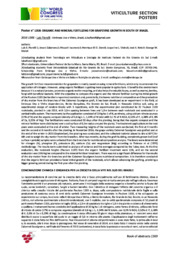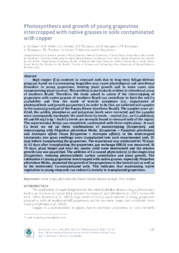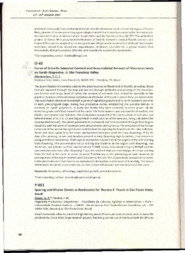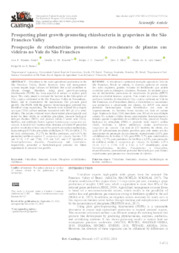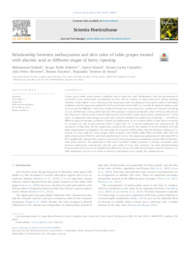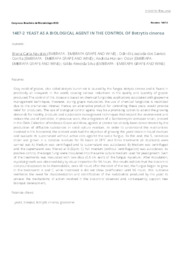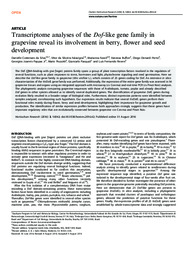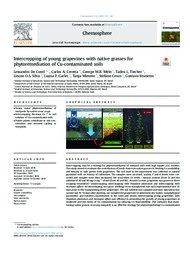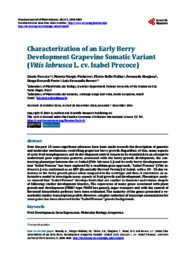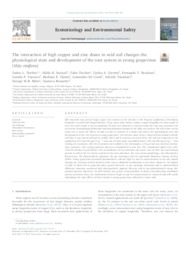Search Publications
Filter by:
| Author(s): FIORELLI, L.; ZALAMENA, J.; IWAMOTO, H.; ZIERO, H. D. D.; VIEIRA, J. L.; NETO, J. A.; MELO, G. W. B. de The growth fertilizer recommendation for grapevine is mainly based on using mineral fertilizers, which only recommends the application of nitrogen. However, using organic fertilizers is getting more p... ... |
| Author(s): DE CONTI, L.; MELO, G. W. B. de; CERETTA, C. A.; TAROUCO, C. P.; MARQUES, A. C. R.; NICOLOSO, F. T.; TASSINARI, A.; TIECHER, T. L.; CESCO, S.; MIMMO, T.; BRUNETTO, G. High copper (Cu) contents in vineyard soils due to long-term foliage-defense program based on Cu-containing fungicides may cause physiological and nutritional disorders in young grapevines, limiting p... ... |
| |
| Author(s): MENDES JÚNIOR, J. P.; FRACETTO, G. G. M.; FRACETTO, F. J. C.; SILVA, D. J.; LIRA JÚNIOR, M. de A.; BARROS, F. M. do R. Viticulture is the main agricultural production in the São Francisco Valley, Brazil; however, farm soil management systems require large volumes of fertilizer that could contribute to climate change.... ... |
| Author(s): SHAHAB, M.; ROBERTO, S. R.; AHMED, S.; COLOMBO, R. C.; SILVESTRE, J. P.; KOYAMA, R.; SOUZA, R. T. de Grapes grown under warm climate conditions tend to show less color development, and this phenomenon isattributed to low anthocyanin accumulation in berry skin in response to high temperature during ri... ... |
| Author(s): AGUSTINI, B. C.; CORREA, O. L. dos S.; OSTER, A. H.; SILVA, G. A. Gray mold of grapes, also called Botrytis bunch rot is caused by the fungus Botrytis cinerea and is found in practically all vineyards in the world, causing serious reductions in the quality and quant... ... |
| Author(s): SILVA, D. C. da; FALAVIGNA, V. da S.; FASOLI, M.; BUFFON, V.; PORTO, D. D.; PAPPAS JÚNIOR, G. J.; PEZZOTTI, M.; PASQUALI, G.; REVERS, L. F. The Dof (DNA-binding with one finger) protein family spans a group of plant transcription factors involved in the regulation of several functions, such as plant responses to stress, hormones and light... ... |
| Intercropping of young grapevines with native grasses for phytoremediation of Cu-contaminated soils. Author(s): DE CONTI, L.; CERETTA, C. A.; MELO, G. W. B. de; TIECHER, T. L.; SILVA, L. O. S.; GARLET, L. P.; MIMMO, T.; CESCO, S.; BRUNETTO, G. Intercropping may be a strategy for phytoremediation of vineyard soils with high copper (Cu) content. The study aimed to evaluate the contribution of South American native grasses in limiting Cu avail... ... |
| Author(s): PASSAIA, G.; MARGIS-PINHEIRO, M.; FIALHO, F. B.; SBEGHEN, F.; PORTO, D. D.; REVERS, L. F. Over the past 10 years significant advances have been made towards the description of genetics and molecular mechanisms controlling grapevine berry growth. Regardless of this, many aspects of early fr... ... |
| Author(s): TIECHER, T. L; SORIANI, H. H.; TIECHER, T.; CERETTA, C. A.; NICOLOSO, F. T.; TAROUCO, C. P.; CLASEN, B. E.; DE CONTI, L.; TASSINARI, A.; MELO, G. W. B. de; BRUNETTO, G. Old vineyards may present high copper (Cu) content in the soil due to the frequent application of Bordeaux fungicide to control leaf fungal diseases. Thus, many wine makers replace copper fungicides b... ... |
Observation
Some of Embrapa's publications are published as ePub files. To read them, use or download one of the following free software options to your computer or mobile device. Android: Google Play Books; IOS: iBooks; Windows and Linux: Calibre.
Access other publications
Access the Agricultural Research Database (BDPA) to consult Embrapa's full library collection and records.
Visit Embrapa Bookstore to purchase books and other publications sold by Embrapa.

